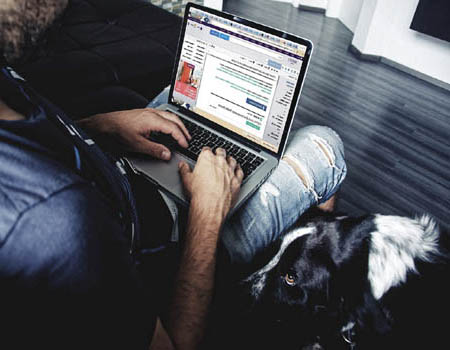Camfecting is a term derived from the words "camera" and "infecting," and it refers to when a hacker takes control of your webcam or camera-equipped laptop without your knowledge or consent. All webcam hackers need to do to hijack your webcam is to install "Remote Control Malware" into your laptop (this can give them access to your personal files, messages, and browsing history). This is commonly done through a virus that you may have downloaded thinking it was from a trustworthy source
The good news is most of the time it is easy to spot and stop to it.
Hackers can exploit vulnerabilities in your device and spy on you, putting your privacy at risk. Fortunately, there are several signs that can indicate if your laptop camera has been hacked. In this blog post, we’ll explore these signs and provide helpful tips to secure your laptop against potential threats.
If your webcam indicator light is on or acting abnormally (blinking LED) even though you did not turn the webcam on, it is a sign that something might not be right. It may only be another program or browser extension running in the background and using your webcam.
Restart your computer and launch your browser. If the webcam light turns on the moment you open the browser, the problem is likely to be in a browser extension. Deactivate your extensions one at a time to identify the culprit.

Another potential reason why your light is flashing might be applications. To test, launch an application and see if the webcam indicator comes on. Continue to open apps one by one until you spot the one using it.
This process might be time-consuming. You can use the Process Explorer tool for Windows. And on macOS, go to Terminal and enter specific commands.
If your webcam light turns on a few seconds after you reboot your computer, without launching any applications, you may have been hacked.
When you try to start your webcam, do you receive an error message stating that the webcam is already active? And you are not running any application that uses the webcam. This could be a sign that your webcam has been hacked.
To check this, go to the "Task Manager".
Or for Linux and macOS, open the "System Monitor".
To open the Task Manger in Windows, right-click on the taskbar and click on Task Manager. Look for all currently running programs under the "Processes" tab. Check for a webcam utility. Again, do not panic yet. It may simply be a default setting to launch once you reboot your device. You can test it by restarting your computer and checking if the webcam utility has started automatically.
Some webcams today can move in various directions and zoom in and out. If you notice your webcam is making movements when you did not give a command, it is probably being controlled remotely.
If a hacker has been spying on you, you might be able to find audio and or video recordings you did not make. Go to the folder where your webcam stores such files. And check your webcam settings to see if this folder location has been changed. Note: Some hackers might simply live stream everything they can see through your webcam.
Scan your computer system for malware. If it finds anything, move the file to quarantine. If it did not solve the problem, and you still have suspicion that your camera is hacked, It may be time to find a tech professional.
There are multiple examples of malware designed to specifically target webcams to allow hackers to secretly watch their victims.
Among the best known of these pieces of malware is Blackshades. As reported by the Washington Post: A remote access trojan (RAT) which was distributed simply by getting victims to visit infected websites, opening malicious email attachments or by plugging USB drives into their PCs.
More recently, Gartner (A leading corporate research and advisory company) reported on the Delilah malware. Which specifically targeted enterprises and uses webcams to collect incriminating evidence on employees and their families. They wanted to blackmail them and extort them to reveal sensitive about their companies.

Let us take a closer look at how hackers might gain access to your laptop camera in the first place. Here are some common methods:
Malware and spyware are common tools used by hackers to gain control over your webcam. These malicious programs can be installed on your laptop through phishing emails, malicious links, or unsafe downloads. Once installed, they allow hackers to remotely control your camera and access other sensitive data on your laptop.
Phishing attacks are one of the most common ways hackers gain access to personal information and devices. These attacks usually come in the form of emails or messages that appear to be from trusted sources (like your bank or a legitimate service). If you click on a malicious link or download an attachment, hackers can gain access to your system, including your laptop camera.
Hackers may exploit weaknesses in your laptop’s operating system or software to gain access to your camera. This is why keeping your operating system and apps up-to-date with the latest security patches is so important. Software developers frequently release updates to fix security vulnerabilities, and if these updates are ignored, your laptop could be at risk of being hacked.
A Remote Access Trojan (RAT) is a type of malware that gives hackers remote control over your system. RATs allow cybercriminals to access your webcam, microphone, files, and even control your device remotely. Once the RAT is installed on your system, hackers can use it to spy on you without your knowledge.

If you’re worried that your laptop camera might have been compromised, you’re not alone. Hackers can exploit vulnerabilities in your device and spy on you, putting your privacy at risk.
When not using your laptop or even your computer, make sure they are turned off when you are not using them. Even the best hacker in the world will not be able to infect you or able to see what you are doing if you close your laptop or if you power down your PC when you are not using it.
A firewall protects your system by monitoring the network traffic and blocking suspicious connections. Make sure the firewall on all your devices is up and running. To access firewall settings on Windows, go to Control Panel > System and Security > Windows Defender Firewall > Turn Windows Firewall On or Off. On macOS, head to System Preferences > Security & Privacy > Firewall.
Choose one with advanced protection against malware, spyware, and viruses. An Antivirus program will take care of detecting and busting malicious threats before they do any harm.
Hackers may disguise themselves as support agents and contact you saying there is an issue with your System or Computer or Program. And they have to take care of it. This is a common Phishing technique that cyber-criminals used to slip remote access software into your device. Such software then allows them to access your camera and manage its permissions.

It might sound too simple, but by putting a piece of tape over your camera is the easiest and 100% reliable way to prevent someone from watching you. If you feel like the tape is not classy enough, many retailers are now offering covers that attach to a webcam and slide open or closed.
How to keep your Mac's camera from spying on you, no tape required Free and paid software can alert you when your camera and microphone are activated.
If you receive threatening messages saying that someone hacked your webcam, Is it actually true? It might just be a social engineering spoof. Without you having to download anything or click on any links. Can they prove that they have webcam footage of you? Does their story make sense? Have you ever actually done what they say you did in front of your computer? These scammers normally do not have the technical knowledge to hack you, but they know how to play on your emotions.
Always be cautious when you get an email with a link from someone you do not know. This technique of Phishing Emails is the Number One Way viruses are installed. It is better to delete the email before clicking on a link rather than risk your digital security.

Laptop camera hacking is a serious privacy concern that can affect anyone. If you notice any of the signs mentioned above, it's important to take immediate action to secure your laptop and protect your privacy. By following the tips provided in this guide—such as covering your camera, keeping your software updated, and using trusted security tools—you can significantly reduce the risk of being hacked and ensure that your personal data remains safe.
Stay vigilant, and always prioritize your digital security.
Joel is a expert in the fields of digital, technology, and business. With a wealth of experience and knowledge, he has successfully navigated...
This policy contains information about your privacy. By posting, you are declaring that you understand this policy:
This policy is subject to change at any time and without notice.
These terms and conditions contain rules about posting comments. By submitting a comment, you are declaring that you agree with these rules:
Failure to comply with these rules may result in being banned from submitting further comments.
These terms and conditions are subject to change at any time and without notice.
Tweet Share Pin Email
Comments